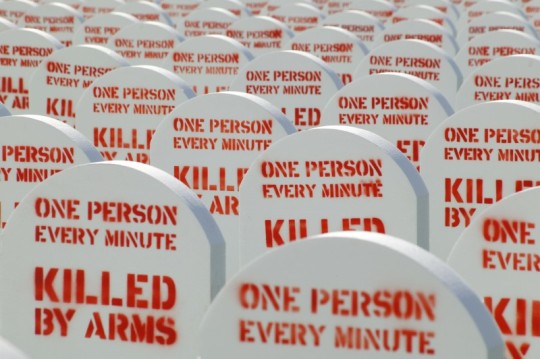
Momentum builds up as key states, survivors, investors' group, and industry give full backing for global Arms Trade Treaty (ATT)
Diplomats at the United Nations' talks on the future Arms Trade Treaty have made serious progress this week with a growing number of key countries bringing their support to the process. The week was also marked by pro-ATT statements from global investors' with over US$ 1.2 trillion in assets, an international group of armed violence survivors and representatives from the arms industry, all calling for a robust and internationally-binding treaty to be agreed in July 2012.
The Control Arms coalition is calling for a bullet-proof treaty that will prevent irresponsible arms transfers that fuel conflict, poverty and serious human rights abuses.
Delegates from across the world met in New York for the last 2011 preparatory committee to discuss the details of a future treaty that would regulate the trade in conventional arms. There is currently no global agreement regulating the conventional arms and ammunition trade.
A working document highlighting the key elements of a potential Arms Trade Treaty (ATT) was presented to the delegates on Thursday.
"The ground-work has been laid for a future arms trade treaty. Despite a number of important gaps in the latest documents and attempts by some to derail the talks, there was substantial progress," said Jeff Abramson, Coordinator of the Control Arms Secretariat.
"Diplomats need to go back to capitals, refine their positions and come back in 2012 with a clear commitment to make the treaty effective. In particular, in order to put a spotlight on the dark world of arms trade, ensuring that States open their books on all their arms transfers will be crucial."
 Thousands of people are killed, injured, raped, and forced to flee from their homes as a result of the unregulated global arms trade. Credit: Oxfam
Thousands of people are killed, injured, raped, and forced to flee from their homes as a result of the unregulated global arms trade. Credit: Oxfam
Over 100 civil society representatives from all regions of the world participated in this week's meetings as part of the Control Arms coalition. The Coalition calls on States to deliver a treaty that actually reduces the harmful impacts of the unregulated arms trade on people.
As a lawyer and survivor of armed violence, Suela Lala of Albania told delegates: "We're committed to making this treaty work. We need states to commit as well. This Treaty must be more powerful than the force of weapons. It must be more robust than the pressure of politics and more beneficial than the incentive of profits."
The Control Arms coalition welcomed the backing of key countries affected by armed violence including from Latin America, the Caribbean, Africa and the Pacific region. During the meeting, the five Permanent Member States of the Security Council (United States, Russia, United Kingdom, France and China) who collectively account for 88% of the global arms trade, also made a joint statement committing their collective support to the process. This is the first such collective statement in the ATT process from the world's biggest arms exporters.
Control Arms is a global civil society alliance campaigning for a "bulletproof" Arms Trade Treaty that will protect lives and livelihoods. A "bulletproof" Arms Trade Treaty means an international legally-binding agreement that will stop transfers of arms and ammunitions that fuel conflict, poverty and serious violations of human rights and international humanitarian law.